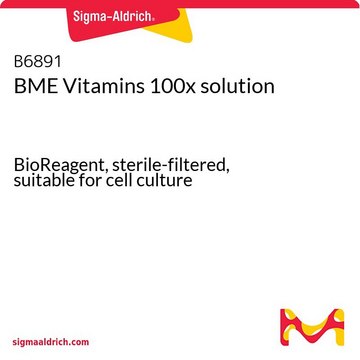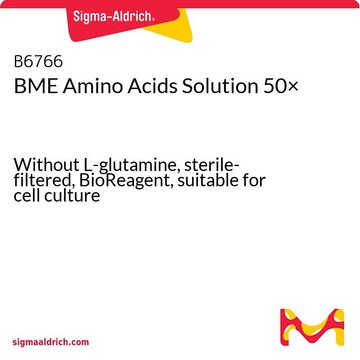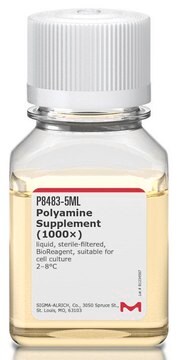R7256
RPMI 1640 Vitamins Solution (100×)
liquid, sterile-filtered, BioReagent, suitable for cell culture
Sinonimo/i:
RPMI 1640 Solution, RPMI 1640 Vitamins, Vitamins Solution
Autenticatiper visualizzare i prezzi riservati alla tua organizzazione & contrattuali
About This Item
Codice UNSPSC:
12352205
NACRES:
NA.75
Prodotti consigliati
Sterilità
sterile-filtered
Livello qualitativo
Nome Commerciale
BioReagent
Stato
liquid
tecniche
cell culture | mammalian: suitable
Impurezze
endotoxin, tested
Colore
yellow to dark yellow
pH
7.2-7.6
Condizioni di spedizione
dry ice
Temperatura di conservazione
−20°C
Descrizione generale
Roswell Park Memorial Institute medium is commonly referred as RPMI. It is a form of medium used in cell culture and tissue culture. This medium contains phosphate and is formulated for use in a 5% carbon dioxide atmosphere. RPMI 1640 is used for the serum-free expansion of human lymphoid cells.
Applicazioni
RPMI 1640 Vitamins Solution (100×) has been used:
- in the preparation of CeM1 medium for the isolation of Caenorhabditis elegans germ cells
- as a component of the amino-acid-deprived medium for the starvation of intestinal porcine enterocytes
- as a component of the stage-8 medium for culturing of human pluripotent stem cell-derived 3D pancreatic progenitor clusters
RPMI 1640 Vitamins Solution (100×) is used as a supplement in cell culture media.
Codice della classe di stoccaggio
10 - Combustible liquids
Classe di pericolosità dell'acqua (WGK)
WGK 3
Punto d’infiammabilità (°F)
Not applicable
Punto d’infiammabilità (°C)
Not applicable
Scegli una delle versioni più recenti:
Possiedi già questo prodotto?
I documenti relativi ai prodotti acquistati recentemente sono disponibili nell’Archivio dei documenti.
I clienti hanno visto anche
Leucine stimulates ASCT2 amino acid transporter expression in porcine jejunal epithelial cell line (IPEC-J2) through PI3K/Akt/mTOR and ERK signaling pathways
Shihai Z, et al.
Amino Acids, 46(12) (2014)
Indranil Biswas et al.
Journal of bacteriology, 189(18), 6521-6531 (2007-07-10)
Streptococcus mutans, the principal causative agent of dental caries, produces four glucan-binding proteins (Gbp) that play major roles in bacterial adherence and pathogenesis. One of these proteins, GbpC, is an important cell surface protein involved in biofilm formation. GbpC is
Simon Kemmerling et al.
Journal of structural biology, 177(1), 128-134 (2011-11-19)
A versatile methodology for electron microscopy (EM) grid preparation enabling total content sample analysis is presented. A microfluidic-dialysis conditioning module to desalt or mix samples with negative stain solution is used, combined with a robotic writing table to micro-pattern the
Simon Kemmerling et al.
Journal of structural biology, 183(3), 467-473 (2013-07-03)
The stochastic nature of biological systems makes the study of individual cells a necessity in systems biology. Yet, handling and disruption of single cells and the analysis of the relatively low concentrations of their protein components still challenges available techniques.
Alexandra S Vagasi et al.
Bio-protocol, 7(15) (2017-09-05)
The Caenorhabditis elegans germ line is an important model system for the study of germ stem cells. Wild-type C. elegans germ cells are syncytial and therefore cannot be isolated in in vitro cultures. In contrast, the germ cells from tumorous
Il team dei nostri ricercatori vanta grande esperienza in tutte le aree della ricerca quali Life Science, scienza dei materiali, sintesi chimica, cromatografia, discipline analitiche, ecc..
Contatta l'Assistenza Tecnica.











